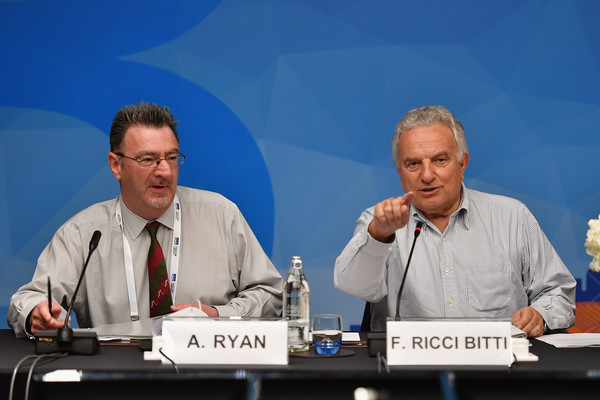“Federations Must Become More Creative And Commercial”
February 28, 2019
In photo above: ASOIF President Francesco Ricci Bitti and Executive Director Andrew Ryan
The Association of Summer Olympic International Federations (ASOIF) today launched its report on the Future of Global Sport, aggregating the views of thought leaders and decision-makers from sport, business and government, and laying out a vision for the future of sport over the next 20 years.
The report addresses political, social, technological, legal and economic influences, all of which are impacting International Federation decision-making and the model under which sport will be managed going forward.
ASOIF President Francesco Ricci Bitti said: “ASOIF has invested significant resources in this project and we believe the results will help IFs to better understand, anticipate and react to the changes and trends confronting them.”
“In fact, some of the outlined future scenarios may serve as a wake-up call. This report invites us all to challenge our thinking at ASOIF and encourage our members to challenge their own.”
Key findings of the report include:
- IFs must demonstrate an exemplary standard of governance in order to maintain the confidence of the media, governments, business and the public at large while also protecting the integrity of their sports;
- IFs will need to develop a more proactive, creative, commercially driven and collaborative mind set, re-evaluating their role and strategies in favour of increased partnership with the private sector;
- IFs will need to embrace “digital” in earnest, transforming their business models, organisational designs and operational cultures;
- Today’s sporting event model will evolve so that true partnerships entailing closer cooperation and balanced risk-sharing among and between stakeholders, including business and government agencies will be a requirement;
- Athletes with sufficient following are gaining influence in today’s disintermediated media landscape and will need to be offered greater incentives to compete in established events;
- In order to attract new people to participate in and consume their sports, IFs must adapt their strategies to a changing society and to how, in future, people will discover and consume content;
- If they adapt, IFs will remain widely accepted as unique bodies effectively capable of governing and administrating their sports on a worldwide basis as custodians of the rules, training of judges, managing the events calendar and coordinating and funding global development initiatives etc; and
- It will become increasingly important to have an effective “umbrella” organisation working to promote and defend the Olympic IFs’ collective common interests given the range of major common challenges that IFs share but can never be expected to address individually.
- Following-up on these findings, the report concludes with a blueprint for IFs to adapt and take advantage of the opportunities presented by today’s disrupted and competitive sporting landscape. This consists of ten recommendations for IFs related to two equally important themes of governance and entrepreneurialism.
The report will also provide ASOIF with guidance and a basis for prioritisation, particularly in relation to its work on establishing a solid future role for IFs, as the involvement of both public authorities (governments) and private business interests in sport continues to grow.To see the entire report click here.

